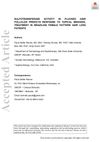Clinical Updates in Hair
January 1997
in “
Dermatologic Clinics
”

TLDR Most treatments for hair loss in 1997 were not effective for most people, and maintaining hair growth was difficult.
The 1997 document reviewed the state of treatments for androgenetic alopecia (AGA), noting that while treatments like spironolactone, flutamide, cimetidine, and dexamethasone were used, there was a lack of evidence for significant hair regrowth. It highlighted that a combination of cyproterone acetate and ethinyl estradiol improved hair growth in women with adequate serum ferritin levels, but with side effects. Minoxidil was effective in increasing nonvellus hairs but hair loss could resume shortly after discontinuation. Finasteride showed promise in young men, and RŪ58841, a topical antiandrogen, was expected to enter human trials. Gonadotropin-releasing hormone agonists combined with oral contraceptives were also mentioned as potential treatments. However, the document concluded that no treatment was effective for the majority of AGA cases, and maintaining hair growth was still challenging, though there was optimism for future treatments with minimal side effects.













